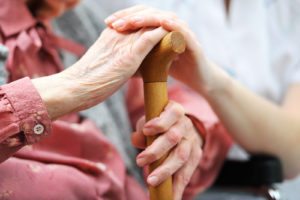How Can You Help Your Parent Cope with Skin Picking Disorder?
Senior Care in West Hempstead NY
October 1 through 5 is Trichotillomania, Skin Picking, and Related BFRB Awareness Week. This weeklong observance is the ideal time for you to learn more about Body Focused Repetitive  Behaviors, or BFRBs, how they can impact your aging loved one’s health, and what you can do to help them to overcome them.
Behaviors, or BFRBs, how they can impact your aging loved one’s health, and what you can do to help them to overcome them.
One of the most common of the BFRBs is excoriation or dermatillomania, also referred to as skin picking disorder. This condition is characterized by a person picking at, rubbing, scratching, touching, or digging at the skin. The compulsion is generally to “improve” their skin in some way, such as by removing a scab, blemish, or other issue. The result, however, can be serious damage to the tissue, vulnerability to infection, and disfigurement. Research shows that approximately 2 to 5 percent of the population of the United States picks or scratches at their skin to a severe enough degree that it causes noticeable damage to their body or impairment in their normal day-to-day functioning. Approximately three out of four people who have this condition are female.
Though the onset of this condition is generally in childhood or during early puberty, it can and does develop at any time of life. In fact, it is a behavior that many describe in older adults who are dealing with other conditions such as Alzheimer’s disease, anxiety, or depression. Helping your loved one to cope with this condition and overcome it is an important part of protecting their health and wellbeing as they age in place.
Use these tips to help you work with your parent as they cope with their skin picking disorder:
- Identify the triggers. Talk to your parent about why they pick at their skin. Common reasons include removal of an imperfection such as a bump, scab, or discoloration, feelings of tension, the urge to pick, or discomfort on the skin. Once you are able to determine what causes your parent to pick or scratch at themselves, you are better able to help them ease these behaviors. Their doctor can work with them to manage this particular trigger so that they are less likely to pick or scratch.
- Reverse the behavior. Once you and your parent’s doctor has identified the stresses and triggers behind your parent’s behaviors you can help them to reverse these behaviors. This is done by replacing the picking behavior with something else. For example, if your loved one starts to want to pick, they can play with a handful of clay or squeeze a small toy to transfer that urge safely.
- Prevent the behaviors. Reduce your parent’s ability to pick by covering up the body part that they usually pick such as with long sleeves, long pants, or even gloves. Cover any sores with bandages to prevent picking at the scabs until they heal. Keeping the skin protected will help to prevent damage.
- Consider senior care. Having a senior home care services provider in the home with your aging loved one is a fantastic way to help them deal with their skin picking disorder. This care provider can help your parent care for their skin so that they are less likely to pick at it, prevent the behaviors, and provide support, companionship, and encouragement that will help them to replace the behaviors and avoid the stress that can worsen them.
If you or an aging loved one are considering senior care in West Hempstead, NY, please contact the caring staff at Family First Home Companions. Serving all of Long Island. Call today: (631) 319-3961
Source: https://www.bfrb.org/learn-about-bfrbs/skin-picking-disorder
- Caregiver of the Month: Kathy - April 8, 2022
- Preventing Colds and Flu in Springtime - March 2, 2022
- Caregiver of The Month: Jacqueline B - February 21, 2022
